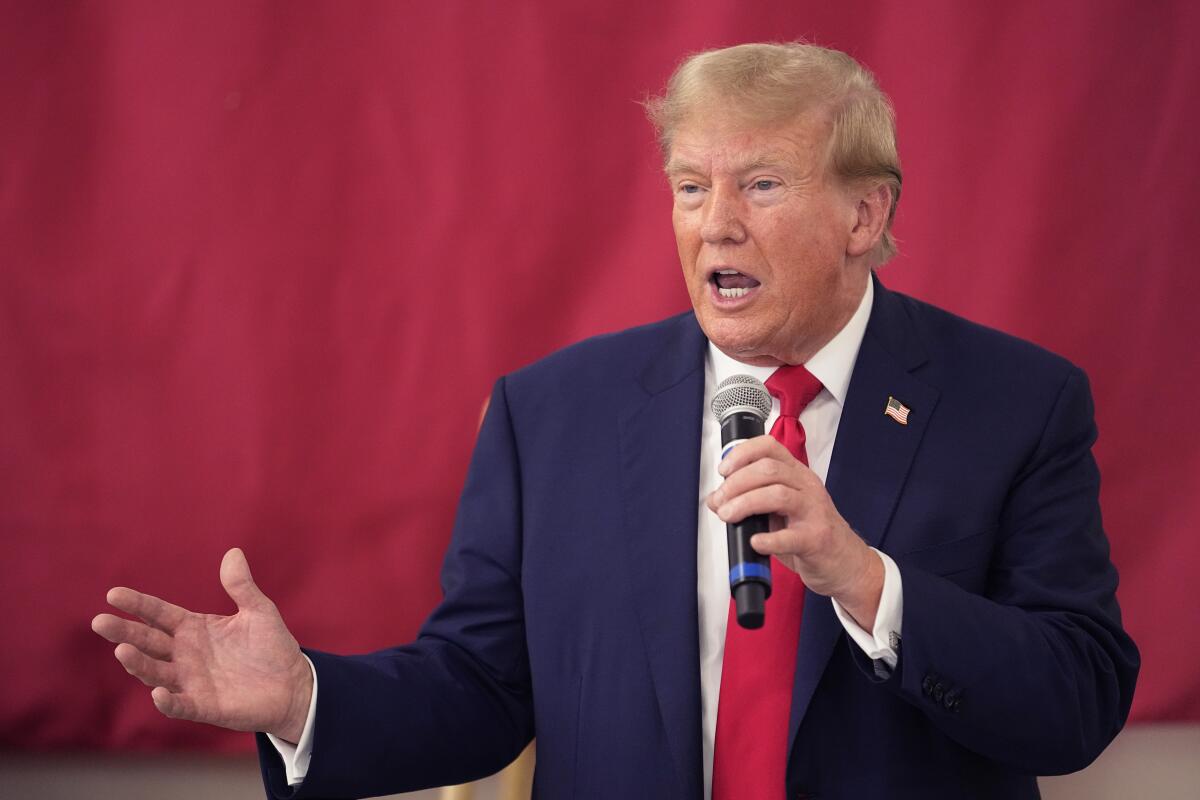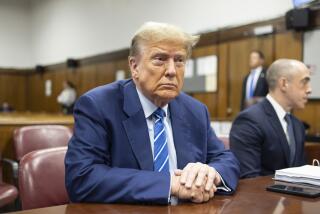Appeals court upholds gag order on Trump in Washington case but narrows limits on his speech

WASHINGTON — A federal appeals court in Washington largely upheld a gag order on Donald Trump in his 2020 election interference case on Friday, but narrowed the restrictions on his speech to allow the former president to criticize the special counsel who brought the case.
The three-judge panel’s ruling modifies the gag order, permitting the 2024 Republican presidential front-runner in polls to make disparaging comments about special counsel Jack Smith, but it reimposes limits on what Trump can say about known or reasonably foreseeable witnesses in the case and about court staff and other lawyers.
The unanimous ruling is mostly a win for Smith’s team, with the judges agreeing with prosecutors that Trump’s often-incendiary comments about participants in the case can have a damaging practical impact, and rejecting claims by defense attorneys that restrictions on the ex-president’s speech amount to an unconstitutional muzzling. The decision lays out fresh parameters about what Trump can and cannot say about the case as he prepares for a March trial and campaigns to reclaim the White House.
“Mr. Trump’s documented pattern of speech and its demonstrated real-time, real-world consequences pose a significant and imminent threat to the functioning of the criminal trial process in this case,” Judge Patricia Millett wrote for the U.S. Court of Appeals for the D.C. Circuit. She noted that many of the targets of Trump’s criticism “have been subjected to a torrent of threats and intimidation from his supporters.”
The case accuses Trump of plotting with his Republican allies to subvert the will of voters in a desperate bid to stay in power in the run-up to the attack on the U.S. Capitol by a mob of his supporters on Jan. 6, 2021. It is scheduled to go to trial in March in Washington’s federal court, just blocks away from the Capitol.
Friday’s opinion says that although Trump has a constitutional right to free speech and is a former president and current candidate, “he is also is also an indicted criminal defendant, and he must stand trial in a courtroom under the same procedures that govern all other criminal defendants.
“That,” Millett wrote, “is what the rule of law means.”
Even so, the court took steps to narrow the order imposed in October by U.S. District Judge Tanya Chutkan, which in addition to barring inflammatory comments about Smith, other lawyers and court staff also restricted Trump’s right to target witnesses.
Saying that part of the order was overly broad, the appellate judges freed Trump to talk to or about potential witnesses — including about their books, interviews and political campaigns — provided that the comments are not about those people’s potential participation in the investigation or trial or about the content of any expected testimony.
“The interest in protecting witnesses from intimidation and harassment is doubtless compelling, but a broad prohibition on speech that is disconnected from an individual’s witness role is not necessary to protect that interest, at least on the current record,” the court wrote.
“Indeed,” the opinion says, “public exchanges of views with a reasonably foreseeable witness about the contents of his forthcoming book are unlikely to intimidate that witness or other potential witnesses weighing whether to come forward or to testify truthfully.”
The appeals court also said that any comment on court staff, other lawyers or their family members was off-limits to Trump “to the extent it is made with either the intent to materially interfere with their work or the knowledge that such interference is highly likely to result.”
The judges, all appointees of either former President Obama or President Biden — both Democrats — had signaled during oral arguments last month that they were inclined to leave the gag order intact but also narrow it.
One significant amendment to the original order is a lifting on a prohibition of verbal attacks on Smith, who has been a frequent target of Trump’s ire since being appointed by the Justice Department in November 2022 to lead investigations into the former president.
“As a high-ranking government official who exercises ultimate control over the conduct of this prosecution, the special counsel is no more entitled to protection from lawful public criticism than is the institution he represents,” the court wrote.
Trump can still appeal the ruling to the full court or to the Supreme Court. Trump campaign spokesman Steven Cheung asserted in a statement that a “huge part” of the “extraordinarily overbroad gag order” had been deemed unconstitutional.
“President Trump will continue to fight for the First Amendment rights of tens of millions of Americans to hear from the leading Presidential candidate at the height of his campaign,” Cheung said.
Judge Chutkan, who was appointed by Obama, imposed the gag order following a request from prosecutors, who cited Trump’s pattern of incendiary comments, including one social media post that said, “If you go after me, I’m coming after you!” The prosecutors said restrictions were necessary to protect the integrity of the case and shield potential witnesses and others involved in the case from harassment and threats inspired by Trump’s social media posts.
The gag order has had a back-and-forth trajectory through the courts, with the federal court that ruled Friday initially lifting it while considering Trump’s challenge.
Smith, the special counsel, has separately charged Trump in Florida with illegally hoarding classified documents at his Mar-a-Lago estate after he left the White House following his 2020 election loss to Biden. That case is set for trial in May, though the judge has signaled that it might be delayed.
Trump has denied any wrongdoing and has claimed the cases against him are part of a politically motivated effort to keep him from returning to the White House.
More to Read
Get the L.A. Times Politics newsletter
Deeply reported insights into legislation, politics and policy from Sacramento, Washington and beyond. In your inbox three times per week.
You may occasionally receive promotional content from the Los Angeles Times.










